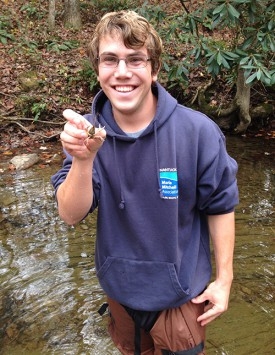Dr. Zach Gajewski
PHD FELLOW GRADUATE | Global Change Center
VT Graduate August 2021, Biological Sciences
Advisor: Dr. Leah Johnson
Google Scholar • gzach93@vt.edu

Zach Gajewski defended in July 2021 and is now a Research Assistant in the Department of Forest and Wildlife Ecology at the University of Wisconsin. His research combines empirical and theoretical methods to understand environmental influences on disease dynamics and population trends.
Zach joined the Johnson Lab in Fall 2016 as a Ph.D student focusing on disease ecology, and completed his degree in 2021. Zach studied how anthropogenic factors, including urbanization and eutrophication, influence disease dynamics. Specifically, he worked on the amphibian chytrid fungus and how the environment influences microbial communities on amphibians. These microbial communities associated with amphibians have been shown to offer some resistance to the fungal pathogen, and therefore, changes to them could alter disease dynamics in the system. Zach combined statistical modeling, mathematical modeling, and field work to examine environmental conditions across wetlands in the Mianus River Gorge Preserve in NY and compare amphibian’s microbial communities at each of theses sites.
Zach received his bachelors in biological sciences from Virginia Tech in 2015. During his time as an undergraduate, he was involved in community outreach and served as an Environmental Educator in Nantucket, Massachusetts. He taught children ages 4-17 about costal ecology and led public and private nature trips and became involved in a number of local science projects, including monitoring barn owl populations, studying biodiversity of snakes on the island, and reintroducing the American Burying Beetle.
Around the same time, Zach became involved in undergraduate research, studying amphibian chytrid fungus and amphibian microbial communities. He tested growth of the fungal pathogen when grown with different microbes on amphibians, to help find a probiotic for the pathogen. Zach also joined labs focusing on stream ecology and limnology, where he investigated aquatic macroinvertebrates metacommunities in a stream network and phytoplankton and zooplankton dynamics in reservoirs. His undergraduate research project combined topics from all three labs to investigate how zooplankton can be used as a biological control for the amphibian chytrid fungus.
Last updated June 2025.


